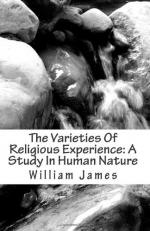|
This section contains 1,662 words (approx. 5 pages at 400 words per page) |

|
Hart, with degrees in English literature and creative writing, focuses her published works on literary themes. In this essay, Hart reflects on James's discussions on sublime happiness and on his reference to Tolstoy's experience with melancholia to better illuminate James's definition of a religious state of mind.
William James begins his fourth lecture in The Varieties of Religious Experience with the question, "What is human life's chief concern?" Shortly thereafter he provides the answer, which is "happiness." Happiness, James tells his readers, is the source behind everything that an individual does, so much so that the overall goal of life is to gain, keep, or recover happiness. It is not mere laughter of which James speaks. It is something that goes much deeper. It goes so deep that this kind of happiness might even be referred to as a religious experience. James clarifies that happiness itself is...
|
This section contains 1,662 words (approx. 5 pages at 400 words per page) |

|




